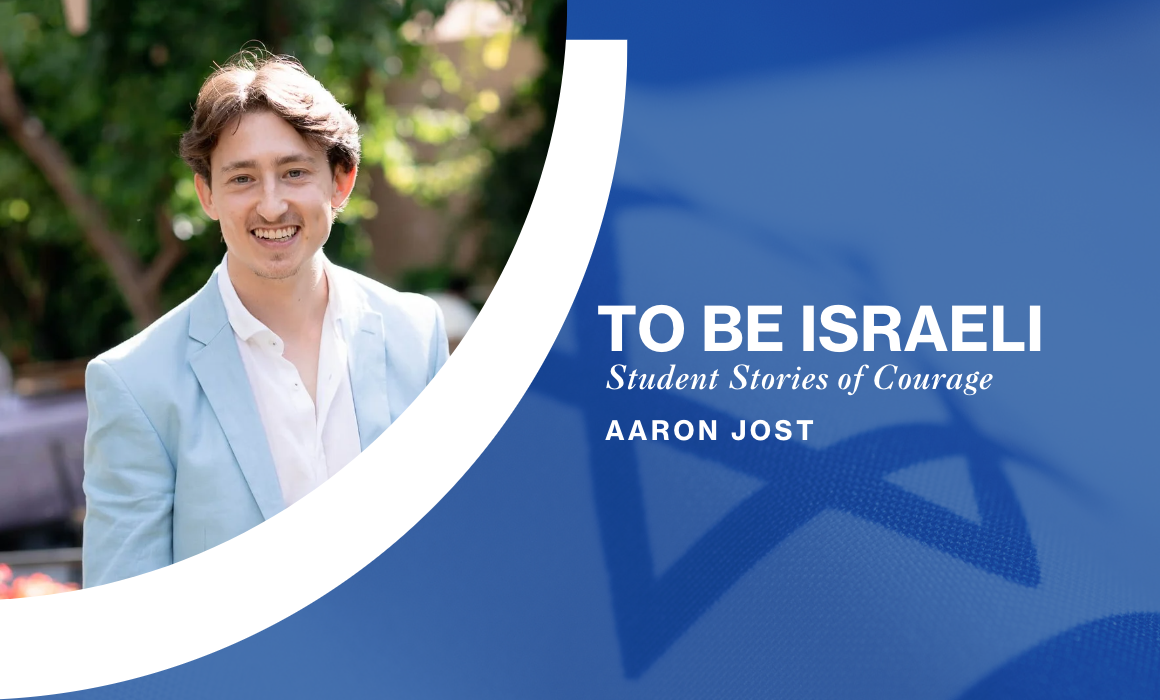Aaron Jost searched several jewelry stores to find the perfect wedding ring for his fiancée, Avital, but nothing was quite right. So being the Technion student he is, he taught himself 3D modeling, designed it in 3D software, found the stone he wanted, and searched for the perfect jeweler and goldsmith to put it together. That’s before arranging for a friend of a friend to stealthily deliver the ring to him in Vienna, check that the sun would shine in just the right spot in the botanical garden in the Belvedere Palace where he would propose, and cover informational signs in the garden with “Will You Marry Me?”
This was no ordinary proposal. Then again, Jost hasn’t always done things according to convention.
Born in Texas and raised in Arizona to a Canadian mother and Swiss father, Jost, a first-year student studying mechanical engineering in the Technion International School, holds four passports and always sought to be independent. At age 17 he moved to Switzerland to pursue a degree in materials engineering, renting a guest house and walking the owners’ dog to pay his way. But his studies didn’t motivate him. “I took a pause and joined the Swiss Army to figure out what I want to do,” he said. “And soon I asked myself, ‘why not join a more meaningful army.”
So he moved to Israel, where his mother and one of his three siblings were living, started learning Hebrew, and joined a combat unit of the Israel Defense Forces. After the army, he taught himself programming and landed a position at the Technion alumnus-founded startup, Liquid 360. A year and a half later he joined the Technion’s preparatory program to brush up on subjects like math and physics. Just two months into his five-month course, the war broke out in Gaza.
“The weekend of October 7, my fiancée and I were spending Shabbat in Tel Aviv with my mom and sister,” he recalled. “I woke up to the sounds of more sirens and larger explosions than I’d ever heard before and knew something was wrong.” Not waiting for the call, he packed his bags and headed off to find his army unit. “In Israel, you understand this is what you have to do. You go and wait for the bureaucracy to catch up.”
Jost had dreamed of becoming a pilot, but a training accident took him out of combat for good. So during the war, he served in an intelligence unit dedicated to the precise and timely dissemination of critical information to personnel in the field. “The commanders and the soldiers are my brothers, friends, and neighbors. That’s what motivated me to do my job as best as I could,” he said. “My information goes directly to the soldiers. If it’s not accurate, then people die. That’s what kept me going.”
Transitioning back to his studies was difficult for Jost after serving for 95 days with only occasional leaves to see his mom and fiancée. He missed half of his preparatory classes, and was plunged into his first year of classes. “But the Technion said, ‘anything you want, we’ll make it work,’” and provided him with financial aid, tutors, counseling, a quiet private study room, and extra time on exams.
An even more important incentive for returning to daily life: Avital was waiting.
The two were married on May 26, 2024 in a ceremony made all the more special because of the ongoing war. “The value of family and friends increases when you realize it’s not trivial that the people you care about are safe and can be with you,” Jost said. Some guests flew to Israel from the U.S. and Canada, while others were afraid to come. One of Avital’s closest childhood friends, living in Israel, surprised them by attending the wedding while still recovering in the hospital from war injuries. At the chuppah, Avital’s injured friend’s father said a prayer for the safety of the soldiers, and Avital’s father gave a prayer for the safe return of the hostages, including family friend Hersh Goldberg-Polin z”l, who was murdered by Hamas in late August along with five other hostages.
Jost hopes to pursue a career “revolutionizing and modernizing the world of construction.” To that end, he will move from the International School, where classes are taught in English, to regular classes, taught in Hebrew, at the Technion. “I’m not scared of a lot of things, but studying engineering, physics, and math in Hebrew is one of them,” he joked.
His wife, who was born and raised in Israel to a Swedish mother, will join him and start her studies for a dual degree in chemistry and biology. After gaining fluency in Hebrew, “I’ll have to learn Swedish, so Avital won’t talk to the kids in a secret language.”


